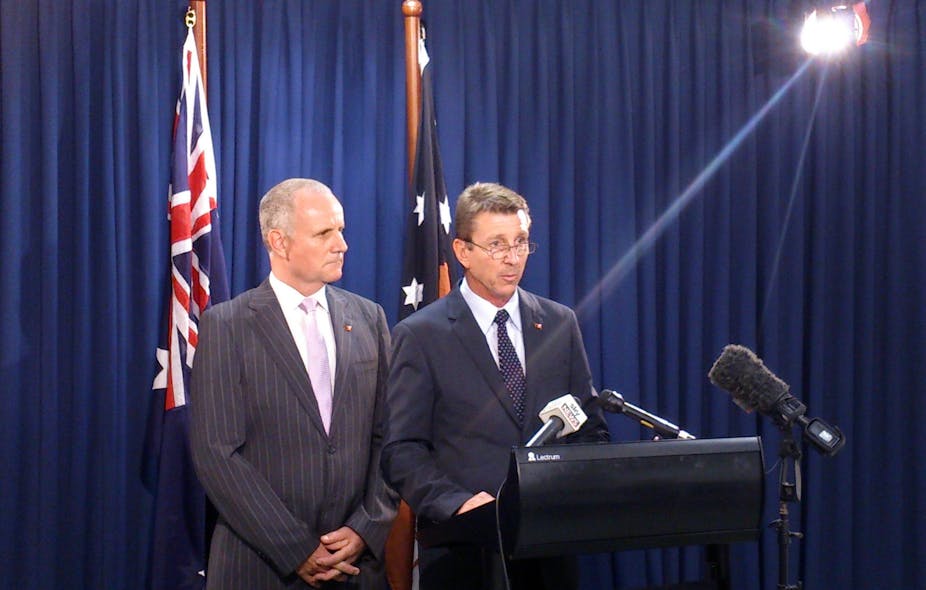Late on Monday night, part of the Northern Territory’s Country Liberal government’s parliamentary wing overthrew the chief minister, Adam Giles. At 1am, somewhat surprisingly, Primary Industries Minister Willem Westra van Holthe emerged as the new chief minister.
However, on Tuesday morning Giles was refusing to formally resign his post, leading to a delay in Westra van Holthe being sworn in.
At first glance, Giles’ ouster was a move that indicated panic caused by last weekend’s electoral backlash against the Queensland Liberal National government. The Giles government was unpopular in the electorate for its budget cuts and privatisation of the Territory Insurance Office.
In December 2014, Giles reshuffled his cabinet – a move interpreted as shoring up his position and rewarding his supporters. That Giles was unable to bring his mate and former treasurer Dave Tollner back into cabinet revealed that his “arrogance” was severely limited. Tollner resigned in August 2014 because of a public homophobic rant against a government ministerial staffer.
It is easy to assume that the change of leader was an effort by the CLP MPs to avoid a similar electoral backlash to that suffered by their confreres in Queensland. That will be the national interpretation of events.
However, NT politics is intensely local. It is to local factors that we must turn to explain the result, if not the timing, of Giles’ overthrow. Queensland provided the spark but the tinder had been smouldering for some time.
We must remember that Giles overthrew the previous chief minister, Terry Mills, only six months after Mills had returned the CLP to government following a decade of Labor rule. So the example was set.
The vital clue lies in the claim that Giles was arrogant and his office too powerful. This is not an unusual criticism of forceful leaders or their private offices – just look at Canberra – but in the NT it has consequences.
For example, Giles and his office were accused of interfering in ministers’ portfolios. Normally that means nothing worse than bruised ministerial egos. However, most NT ministers are close to their departments, so significant sections of the public service were alienated both by this and by previous budget cuts.
This has electoral spin-offs. About one-fifth of the electorate are NT public servants. They constitute the most important electoral bloc in the NT. This factor is the genesis of the claims that Giles was arrogant.
One of the most prominent recent criticisms of Giles was that he went on holidays amid a crisis surrounding Police Commissioner John McRoberts. McRoberts was accused of interfering in a police investigation of a travel agent who had allegedly rorted a travel scheme that gives NT seniors a free airfare to southern cities every two years. He resigned his post last month.
The NT’s localism was on full display as the case evolved. The travel agent was supposedly in an informal intimate relationship with McRoberts. It was further illustrated when various statutory officers who would normally have conducted the investigation into McRoberts’ conduct had to rule themselves out because they either lived with one of the protagonists or were friends with them.
Media leaks from within the police force gave the saga continued prominence. McRoberts (a “southerner”) was unpopular within the police force, which was generally unhappy when Giles re-appointed him in May 2014 for a further five-year term. The police wanted a local to be police commissioner, again reinforcing the NT’s localist politics.
By coincidence, both Westra van Holthe and his deputy, John Elferink, are former police officers. They were probably well – if informally – briefed about the ongoing McRoberts affair.
The national press may make something of Giles being Indigenous but this was not a factor. Giles is from the ACT and not an Indigenous Territorian. One of his first acts as chief minister was to abolish the Indigenous Affairs portfolio. He claimed that because 30% of Northern Territorians are Indigenous, all ministers should be focused on Indigenous affairs.
Alison Anderson led a walk-out of Aboriginal MPs from the CLP shortly after Giles became chief minister. Anderson and fellow Indigenous MP Larisa Lee have rejoined the CLP in the wake of Giles’ removal. Giles had limited Aboriginal support and his overthrow was a Darwin event. Aboriginal interests were not a factor.
The NT’s localism has not yet finished playing out, with the Alice Springs branch of the CLP apparently outraged at Giles’ ouster.

